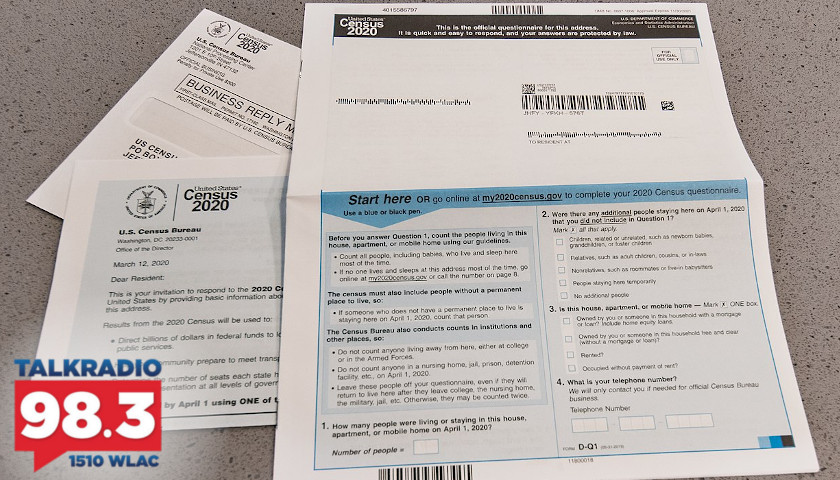On Wednesday’s Tennessee Star Report with Michael Patrick Leahy – broadcast on Nashville’s Talk Radio 98.3 and 1510 WLAC weekdays from 5:00 a.m. to 8:00 a.m. – Leahy was joined on the line by the Census Bureau’s Regional Director Michelle Archer.
During the third hour, Archer explained the purpose of the census and how it can provide for proper grants and funding to be distributed by state and counties. She added that April 1 was a purposely chosen day as it sets as a reminder and allows enough time for as many people as possible to complete the forms whether by mail, online or phone.
Leahy: And we are joined now by Michelle Archer Assistant Regional Manager for the Census Bureau who is going to talk a little bit about something else going on in 2020. Good morning Michelle.
Archer: Good morning Michael and thank you very much for having me and providing me with the opportunity about the importance of the Census. I’m happy to be here.
Leahy: I’m an amateur genealogist and I pour through all of this, you know what I’m going to talk about here. I pour through all of the census records that go back to 1790. When there was a fire and most of them were gone. But we still have those available at ancestry.com up to 1940. I think 1950 is going to come in shortly. I will tell you this though, I love the census for my genealogical research. I have to tell you when I get that form, I say, do I really want to fill this thing out? Tell me why I should.
Archer: Absolutely. For a number of reasons. Not only for genealogy but for the importance of the community. A lot of people don’t realize that the Census Bureau collects data in order to fund programs for things like emergency management. Healthcare infrastructures. Schools. Federal programs.
So the data that we collect and the population data that we collect is used directly to determine how much funding each state gets for those programs. As well as other state and localized programs. As well as redistricting. Redistricting that happens after census as well. Including the ancestry.com. The ancestry.com uses our records in order to help update their records as well.
Leahy: So the constitution requires that a census is taken every ten years. So we’ve been doing this since 1790. Every 10 years. It’s 2020 so the census is in process. You have a lot of stuff going on long before the coronavirus pandemic hit. Well, it has been all coronavirus pandemic for the past 30 days. How has the coronavirus pandemic influenced the way the Census Bureau is collecting data?
Archer: Right. The census data hasn’t been immune to the coronavirus crisis. Just like the country and the world we are taking measures to help make sure that our employees and the public are safe and healthy. So some of the things that we’re doing is delaying operations.
So our in field operations are the operations are where we have face to face time with the public. And because we have worked with the guidance from local states and federal health administrators to help us determine when best to do that we have decided to delay the in field operations face to face.
But some of the things that we can do and the public can do to help us with that is to complete this form now. Census forms are going out. The invitations have gone out. People are receiving them in the mail. We are really strongly encouraging people to respond online. Online. We are strongly encouraging that.
That’s the quickest fastest and easiest thing to do. We also have other options for response. People can call into our questionnaire assistance center and speak to a live census taker that will have them complete the questionnaire. The number is 844-330-2020. Another option is starting next week we will be mailing out paper forms to the majority of the United States so that people wanting to respond via paper, mailbox or phone and can do so. And those forms will start going out as early as next week.
Leahy: So the postcard you’ve sent out was, hey just contact us and go online? And you’re going to send out now more detailed paper documents? Is that right?
Archer: Right. So it’s not actually a postcard, its an invitation letter that gives a census ID and you’ll go online and put that ID in. The ID is a link to your address so that we know that that address or household is responding. It’s the same exact questions that would be on the paper form just in an easier format that people could use and you know just click through and respond online. The paper form would have the same exact questions that the online form does as well. It just gives people another option for responding.
Leahy: So I got that letter on Friday. And it’s sitting on my table unopened. (Chuckles)
Archer: Oh no! Oh no! You are going to respond right?
Leahy: Well like most of us we have a few other things to do. Some of us not so much. Since I’m in the news business I have a lot to do these days. So if I were to go in and be energetic and I would open up that envelope there’s a super-secret code just for me there right?
Archer: Absolutely. Not just for you but for that address. For that address. It’s not tied to any particular person but that address. You put that code in and you will be responding for whoever lives in that household or that address on April 1. Let me speak about the significance of today. We really appreciate you having me on today because April 1 is what we deem Census Day.
And Census Day is the reference day that we use to determine where someone lives. So the first question on the form is who lived in this address on April 1 of 2020? We really want to get a strong push to encourage people to respond today. Not only today because the census response will be open for several months on end.
But this gives a strong push for people to respond and get the form completed. So, Michael, I’m asking you to complete your form today because it’s important and to really share that message not with only people in your family but with other friends and family members. And really get the people pushed to respond to the census so that we can get the results and the data we need for Nashville and the state of Tennessee.
Leahy: So I go in and open it up and I get my super-secret code for my residence, how long will it take me to do that online?
Archer: It depends on how many people live in the household but typically its less than 10 minutes to respond.
Leahy: I could probably do that. Just because you’ve asked me. Only because you’ve asked me I’m going to do that sometime this week.
Archer: Thank you.
Leahy: You are very welcome. About this reference day thing? A couple of things. How long has April 1 been the reference day for the census?
Archer: April 1 has been the reference date for several censuses. And it was determined that we needed to use a reference day to complete the data on where someone lives.
Leahy: That’s smart. As a genealogist, I go back and look at 1840, 1850, 1860 and that’s one of my big questions. Sometimes I would think they would have various reference days all throughout the year. So it got confusing when people would move from one state to the other.
Which would happen with a surprising degree of frequency back then. I like that. Can you consider this? (Chuckles) Because I think this would be a good branding move for the Census Bureau. When you talk to your boss and they talked to their boss, why don’t you think about making April 2 the reference date instead of April 1 for obvious reasons?
Archer: Obvious reasons. Right. We are considering the other reason that April 1 is significant. We need to have a beginning of the moth because it is easier for everybody to determine and help determine. And April first happens to be the day.
Although we want people to know that its April Fools’ Day. We also want you to link that to Census Day. It’s April Fools’ Day however it is important and I do want to share this message with everyone I know in order to get our forms completed and ourselves counted and get our fair share of our funding.
Leahy: I can understand the timeline. It makes sense if you want it all done by the end of the year. It makes sense. But I’m going to argue at the beginning of the month. Make it March 1 or May 1. I don’t think it’s the greatest branding. But that’s just my view. (Chuckles)
Archer: Alright.
Leahy: Tell your bosses!
Archer: I will. I’ll give them the message Michael.
Leahy: I’m sure they’ll be listening.
Leahy: Michelle thank you so much for calling us and perhaps you’ll come back in a couple of months and tell us the progress on the Census Bureau.
Archer: Anyone can track progress at 2020census.gov. There’s a really cool map online that we use in order to track progress. You can see how well you all are doing.
Leahy: 2020census.gov.
Listen to the full third hour:
– – –
Tune in weekdays from 5:00 – 8:00 a.m. to the Tennessee Star Report with Michael Patrick Leahy on Talk Radio 98.3 FM WLAC 1510. Listen online at iHeart Radio.
Photo “U.S. Census Bureau Mail” by Mj. CC BY-SA 4.0.





